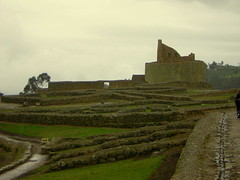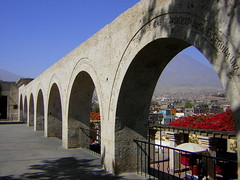The last of the Taushiros
Peru’s Amazon rainforest has seen the last of the great Taushiro nation. Prospering in the area of the Quebrada Aguaruna in Alto Tigre, Loreto, for thousands of years, the Taushiro, like countless other tribes, have been wiped out by us and our world.
by José Álvarez Alonso
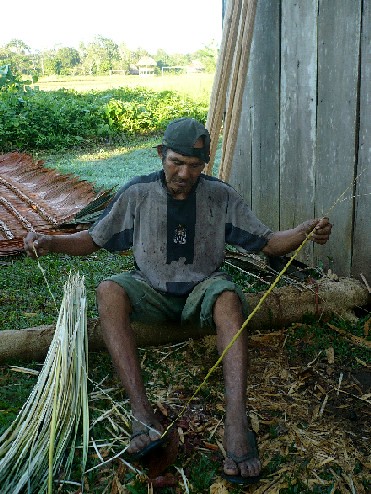
Photo: Euclides Hidalgo
Amadeo García, the last of the Taushiros, escaped death because was living in the town of Intuto, capital of El Tigre, a day and a half away by canoe from his homeland. He was lucky, he was receiving treatment for a terrible new illness. The last time he went back to his ancestral town was to bring his brother Juan, dying from the same illness, to Intuto for the same treatment.
Juan, the penultimate of survivor his people, was latter buried, just a short time after his father and aunt had also passed away. At their graves remain dozens of dogs, companions of the last Taushiros during their final years. Here they stay, watching over the graves of their masters for weeks until they die of hunger, loyal to the end. Perhaps the Taushiro kept so many dogs to fill the vacuum left by the deaths of all their children, so that their ghost towns weren’t quite so quiet.
José Hualinga, a Kichwa-Alama hunter that travelled along the Tigre river, by chance saw, between the bushes, a canoe that appeared abandoned. When he approached he found Juan inside, weak and suffering an agonising death from malaria. He took him to Intuto, where he was slow to recover.
Malaria did not exist in the Amazon. It was a disease brought here by outside invaders, illegal loggers, barbaric slavers and the first missionaries. With no resistance to the disease, countless native tribes were wiped out, while others were weakened so much that outsiders – our oil companies, illegal loggers and other criminals from our civilisation – could come in and wipe out the rest so that we can benefit from the destruction of their land.
Juan spoke at the most just a few words of Spanish and he wasn’t much of a talker, but, shivering from the fever of his malaria, he explained that he had had to bury, just days ago, his father and his aunt. He later left in his canoe, letting the current of the Quebrada Aguaruna tributary take him to the Tigre river. He couldn’t make it to Intuto and would have died there and then if it wasn’t for that passer-by.
Juan couldn’t get used to life in the tiny village of Intuto. As soon as he had his strength back, he left Intuto and returned to the forest and his uninhabited village. Months later, the vicious malaria returned and took with it Juan and the very last of the Taushiros. Today, Amandeo is the last Taushiro of full blood and the last speaker of the Taushiro language.
Proud Hunter
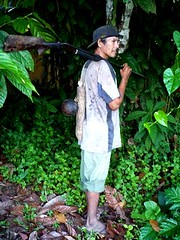
Photo: Euclides Hidalgo, Intuto, 2008.
The first time I saw Amadeo, in January 1984, I was very impressed. He came walking along a street in Intuto with a rifle slung over his shoulder. He gave me an impression of someone with a pride and dignity that is not very common among the Amazonian indigenous. I knew of this man much before, from the Spanish missionary Tomás Villalobos, who had worked in Intuto since the early 1970s. He spoke to me of Amadeo and the sad history of his people, on the border of extinction.
Amadeo was famous as a great hunter. “In those times we hunted the big animals with spears and arrows for the smaller ones. Now I cant hunt like that because there are so few animals, I can only hunt with a rifle, and very deep in the jungle, walking for one day“, he explains. He remembers with nostalgia the old days, when he learnt the arts of hunting and fishing with his father and his uncles. He also remembers with joy the moment when the hunters arrived back to the village loaded down with meat. That day was a celebration, and all would eat until they were stuffed full.
Nostalgia
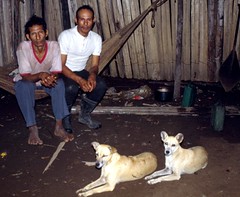
Photo: José Álvarez
Amadeo remembers well the abundance of animals and trees in the rainforest when he was young, and the beautifully made canoes that lasted decades. “The Taushiros cared for the forest because the forest gave us our food. We didn’t cut down the trees like they [the outsiders] do now, just to get at its fruit. The Taushiros were very good climbers, they could even climb the biggest trees like the leche caspi“, he says. With sadness he explains that these giant trees that once fed his people are now gone, cut down by another tribe who had forgotten the old ways and become part of our modern destructive world. Other trees, great numbers of them, were removed by outside loggers from far away. The animals too, the vast majority, were systematically exterminated by professional hunters from the outside world who would skin them and leave they carcases to rot, before moving on a ravaging other virgin areas of forest.
Today, the territory of the Taushiros is, like many of parts of the Peruvian rainforest, permanently devoid of animals and of fine trees. To find wildlife you have to travel days into the forest, to parts not yet destroyed but that soon will be.
Generational Change
Amadeo had five children with a woman named Margarita Machoa, an indigenous Kichwa-Alama. She later left him, because he was an “auka”, an indian, someone who had only recently had contact with civilisation and “learnt to wear clothes”. An evangelic missionary, in what was a difficult time for Amadeo and his children, offered to adopt them and take them back to his home country of Puerto Rico, an offer Amadeo had no choice to except. He couldn’t support his family. There was no longer anything to eat.
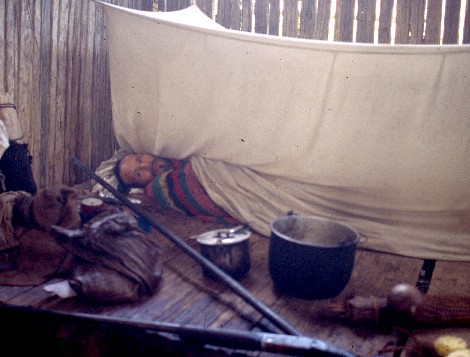
Photo: José Alvarez
With his children left the last hope that new blood would learn and speak the Taushiro language. His children have grown up in an environment far removed from the rainforest and their Taushiro heritage. They had little contact with their father other than sporadic letters.
One day I went to visit Amadeo. They had told me he was very sick, but not only was he sick, he was very depressed. In a daze he spoke to me, crying, about his children who did not want to go to see him, didn’t want to help him, didn’t want to know anything about him and his primitive ways, didn’t want to learn about their Taushiro origins, nor the language, nor the culture.
When Amadeo dies, so will the Taushiro.
For those who read Spanish, you may enjoy the story of Amadeo and his precious bible;
Amadeo y la Biblia
Una de las últimas conexiones con su pueblo y con su idioma estuvo, curiosamente, en la Biblia. Amadeo, que no tiene ya con quien conversar en su propio idioma, se refugiaba en la lectura del Nuevo Testamento en Taushiro que tradujeron hace años los lingüistas del ILV, los que también le enseñaron los rudimentos de la lectura. Todos los días, como si de un ritual sagrado se tratase, se calzaba con cuidado sus lentes de aumento y leía algún fragmento de su destartalado pero precioso libro, rememorando quizás otros tiempos de largas conversaciones en Taushiro con su gente.
En 1997 un amigo común en Intuto, Jorge Coral, me comunicó por radio desde Intuto que se había producido una desgracia: Amadeo había perdido sus preciados lentes de leer, no podía leer su Biblia y estaba muy triste. Me pedía que le enviase desde Iquitos unos nuevos. Obviamente esto no era posible, necesitábamos saber las medidas de su vista, así que no quedaba otra que Amadeo bajase a Iquitos a medirse la vista. Conseguimos convencerlo de que viajase en la siguiente lancha, acompañado con nuestro común amigo Jorge Coral.
Amadeo se alojó en mi casa. Al día siguiente le pregunté que tal había descansado, y me confesó que no pudo dormir en la cama (que tenía un colchón de resortes) y había tenido que dormir en el suelo, ya que estaba acostumbrado a dormir sobre un simple emponado (piso de tronco de palmera). El calzado fue otro problema: Amadeo siempre había caminado descalzo y, para ir al monte de caza, con botas de jebe. Para ir oculista le presté unas zapatillas deportivas, pero sus anchos y encallecidos pies no se acostumbraban, y luego de caminar unos metros se las tuvo que sacar y caminar descalzo: prefería quemarse las plantas con el cemento calcinado por el sol que torturar sus pies con las zapatillas.
Le conseguí unos nuevos lentes el mismo día, pero se sentía tan incómodo en la ciudad, que a cada rato preguntaba por la lancha para Intuto, que se demoró varios días en zarpar. Cuando por fin se embarcó para Intuto, juró no volver a la ciudad jamás.
Hoy Amadeo ya no cuenta más con ese su último vínculo con el idioma Taushiro. La humedad y el comején, que devoraron las últimas casas y las cruces de las tumbas de sus parientes en Aguaruna, acabaron destruyendo su preciado Nuevo Testamento en Taushiro.



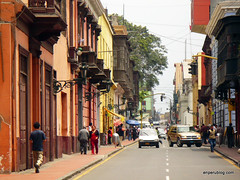
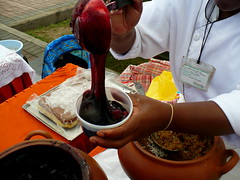
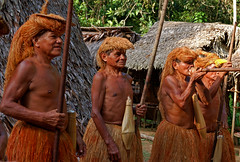
![Lord of Ucupe: “King of Bling” Tomb Sheds Light on Ancient Peru [Featured]](http://farm4.static.flickr.com/3001/2702458380_c996b07c98_m.jpg)
